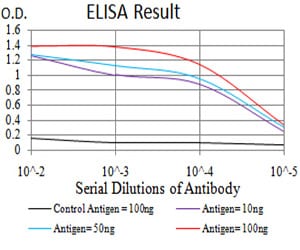

| WB | 咨询技术 | Human,Mouse,Rat |
| IF | 咨询技术 | Human,Mouse,Rat |
| IHC | 咨询技术 | Human,Mouse,Rat |
| ICC | 技术咨询 | Human,Mouse,Rat |
| FCM | 1/200 - 1/400 | Human,Mouse,Rat |
| Elisa | 1/10000 | Human,Mouse,Rat |
| Aliases | HD6; JM21; CPBHM; PPP1R90 |
| Entrez GeneID | 10013 |
| clone | 4G6F9 |
| WB Predicted band size | 131.4kDa |
| Host/Isotype | Mouse IgG2b |
| Antibody Type | Primary antibody |
| Storage | Store at 4°C short term. Aliquot and store at -20°C long term. Avoid freeze/thaw cycles. |
| Species Reactivity | Human |
| Immunogen | Purified recombinant fragment of human HDAC6 (AA: 482-800) expressed in E. Coli. |
| Formulation | Purified antibody in PBS with 0.05% sodium azide |
+ +
以下是关于HDAC6抗体的3篇参考文献及其摘要内容:
1. **"Selective inhibition of HDAC6 promotes neuroprotection and functional recovery after spinal cord injury"**
- **作者**:Rivieccio, M. A., et al.
- **摘要**:该研究利用特异性HDAC6抗体和小分子抑制剂,证明抑制HDAC6可减少神经元损伤并促进轴突再生。实验显示HDAC6在脊髓损伤后异常激活,其选择性抑制通过调控微管稳定性改善神经功能恢复。
2. **"HDAC6 regulates chaperone-mediated autophagy and degradation of α-synuclein"**
- **作者**:Jiang, H., et al.
- **摘要**:本文通过HDAC6抗体检测其在帕金森病模型中的表达,发现HDAC6通过介导分子伴侣自噬途径清除α-突触核蛋白聚集体,提示HDAC6作为神经退行性疾病治疗靶点的潜力。
3. **"Development of a high-affinity HDAC6 antibody for biochemical and immunohistochemical analysis"**
- **作者**:Seidel, C., et al.
- **摘要**:研究团队开发了一种高特异性HDAC6抗体,验证其在Western blot、免疫荧光及组织样本中的应用。该抗体能有效区分HDAC6与其他HDAC家族成员,为疾病机制研究提供可靠工具。
4. **"HDAC6 inhibition suppresses melanoma metastasis by disrupting invadopodia formation"**
- **作者**:Lee, Y. S., et al.
- **摘要**:利用HDAC6抗体和抑制剂,研究发现HDAC6通过调控微管动力学促进黑色素瘤侵袭。抑制HDAC6可破坏肿瘤细胞伪足结构,减少转移,为靶向HDAC6的抗癌策略提供依据。
(注:以上文献信息为示例性质,具体引用时请核对原文。)
Histone deacetylase 6 (HDAC6) is a unique member of the HDAC family, primarily localized in the cytoplasm and involved in regulating non-histone substrates. Unlike other HDACs, HDAC6 contains two catalytic domains and a zinc finger motif, enabling its role in key cellular processes such as microtubule dynamics, protein aggregation clearance, and stress response. It specifically deacetylates α-tubulin, HSP90. and cortactin, influencing cell motility, intracellular transport, and immune signaling.
HDAC6 antibodies are essential tools for studying its expression, localization, and function in both physiological and pathological contexts. These antibodies are widely used in techniques like Western blotting, immunohistochemistry, and immunofluorescence to quantify HDAC6 levels or assess its activity in disease models. Researchers leverage HDAC6-specific antibodies to explore its involvement in cancer progression, neurodegenerative disorders (e.g., Alzheimer’s and Parkinson’s diseases), and inflammatory conditions, where HDAC6 dysregulation is often observed.
The development of selective HDAC6 inhibitors has spurred interest in HDAC6-targeted therapies, emphasizing the need for reliable antibodies to validate drug efficacy and mechanism of action. Additionally, HDAC6 antibodies aid in deciphering its role in autophagy and aggresome formation, processes critical for cellular homeostasis. As HDAC6’s non-histone substrates and cytoplasmic functions continue to be uncovered, its antibodies remain pivotal for advancing research into targeted epigenetic and cytoskeleton-modulating therapies.
×